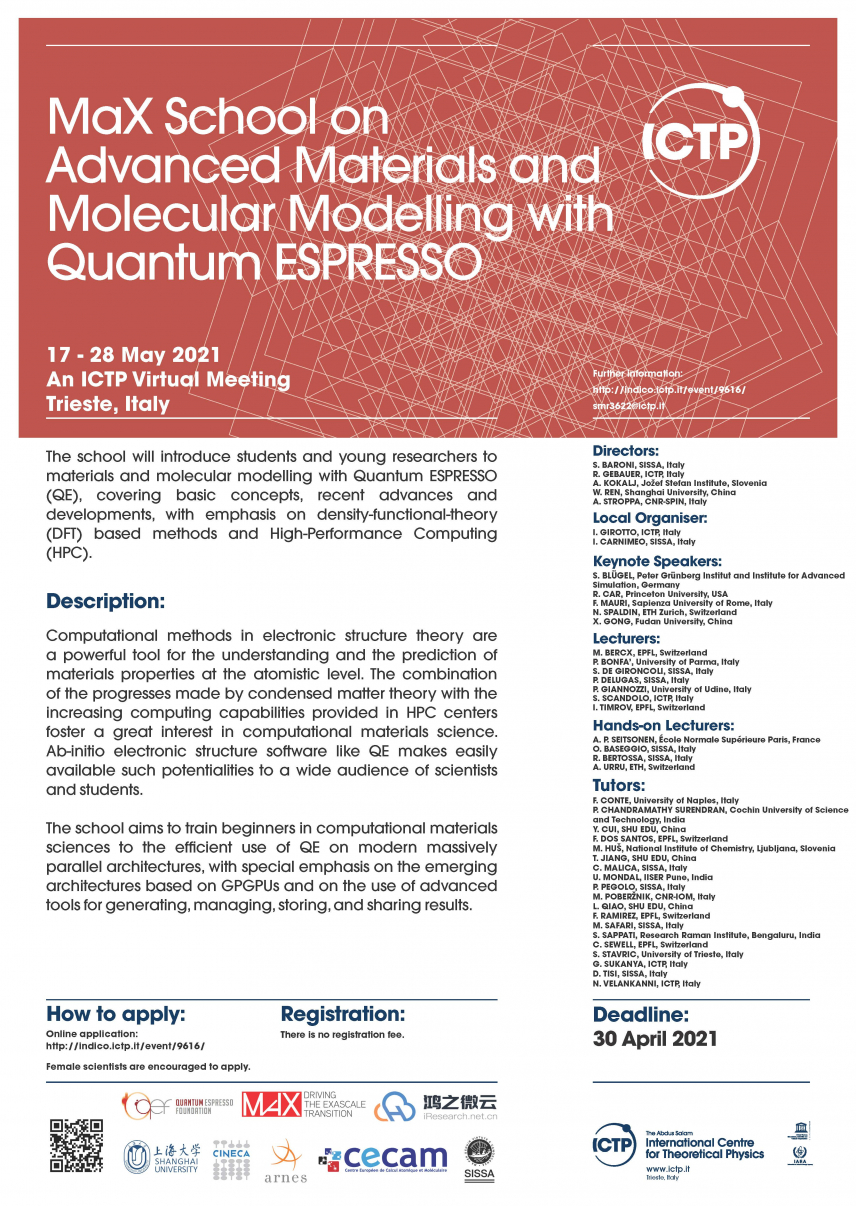The first-principles school on electronic-structure calculations and materials modeling based on Quantum ESPRESSO (QE) software has successfully ended. The event was, for the first-time, entirely held on-line.
The school aimed to introduce students and young researchers to materials and molecular modelling with Quantum ESPRESSO (QE), covering basic concepts, recent advances and developments, with emphasis on density-functional-theory (DFT) based methods and High-Performance Computing (HPC).
The event was preliminarly scheduled to be held in Shanghai University in June 2020, in the framework of the CNR-SPIN and Shanghai University collaboration, continuing the series of schools on computational materials science started in 2017, but it was canceled due to COVID-19 pandemic.
Thanks to an idea of Stefano Baroni, full professor at SISSA, the school was re-scheduled this year, entirely on-line, on 17th-28th May with an innovative two-weeks school program: the lectures were held in the mornings (CEST) followed by hands-on sessions. In this way, the chosen time-window allowed students and researchers from Far-East and South-East Asia to attend the school in real-time. In order to permit the students from a different time zone (USA, for example) to attend the lectures, the entire school was video-recorded and it is now available on the web. For details click here. There was no registration-fee.
The school was organized by Stefano Baroni (SISSA), Ralph Gebauer (ICTP), Anton Kokalj (Jožef Stefan Institute), Wei Ren (Shanghai University), Alessandro Stroppa (CNR-SPIN), with a strong support by the local organizers Ivan Girotto (ICTP), Ivan Carnimeo (SISSA). Special thanks to the the school secretary for her work: Adriana Pinto from ICTP. The event was based on the ZOOM platform with technical support by Information and Communication Technology Section (ICTS-ICTP), in particular by Massimo Maffione who provided technical assistance during the lectures and the hands-on.
The sponsors were: ICTP (International Center for Theoretical Physics), the MAX (MAterials design at the eXascale is a European Centre of Excellence which enables materials modelling, simulations, discovery and design at the frontiers of the current and future High Performance Computing (HPC), High Throughput Computing (HTC) and data analytics technologies), CINECA, Shanghai University, Arnes, CECAM, SISSA, Quantum-Espresso-Foundation (QEF).
In particular, the QEF has had a prominent role in promoting the school. The foundation fosters and supports the design, implementation, maintenance, and free dissemination of high-quality, high-performance open-source scientific software for ab-initio quantum numerical modeling of materials. QEF coordinates and supports research within the Quantum ESPRESSO developer community, in order to enhance the scope and performance of the Quantum ESPRESSO software; it helps the Quantum ESPRESSO users and developers communities to flourish; it holds and manages the copyright of the Quantum ESPRESSO software and documentation, as well as it protects its open-source character and free distribution; it promotes education and advanced training in the quantum simulation of materials. Last, but not least, courses, lectures, and workshops based on the use of the Quantum ESPRESSO software are organized and sponsored worldwide, with particular attention to developing countries, as shown by the organization of this school.
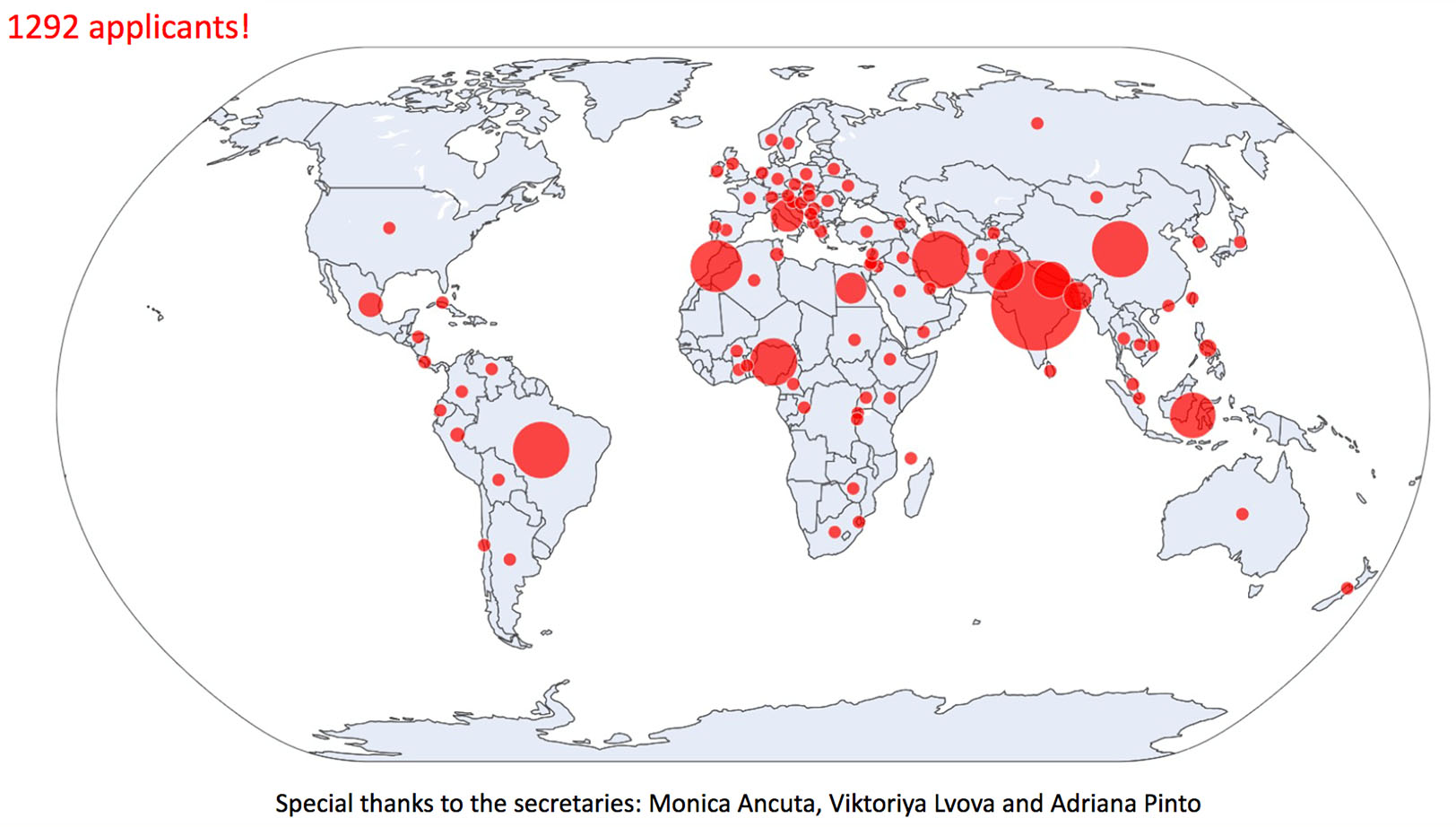 The school was highly appreciated world-wide, with a record-breaking number of applicants (1292), i.e. the largest number ever reached in the history of ICTP online activities. For technical reasons, only about 120 participants were selected to attend the online school, with special attention to gender and nationality balance. However, applicants who were not selected as participants, could attend the school in streaming through youtube channel.
The school was highly appreciated world-wide, with a record-breaking number of applicants (1292), i.e. the largest number ever reached in the history of ICTP online activities. For technical reasons, only about 120 participants were selected to attend the online school, with special attention to gender and nationality balance. However, applicants who were not selected as participants, could attend the school in streaming through youtube channel.
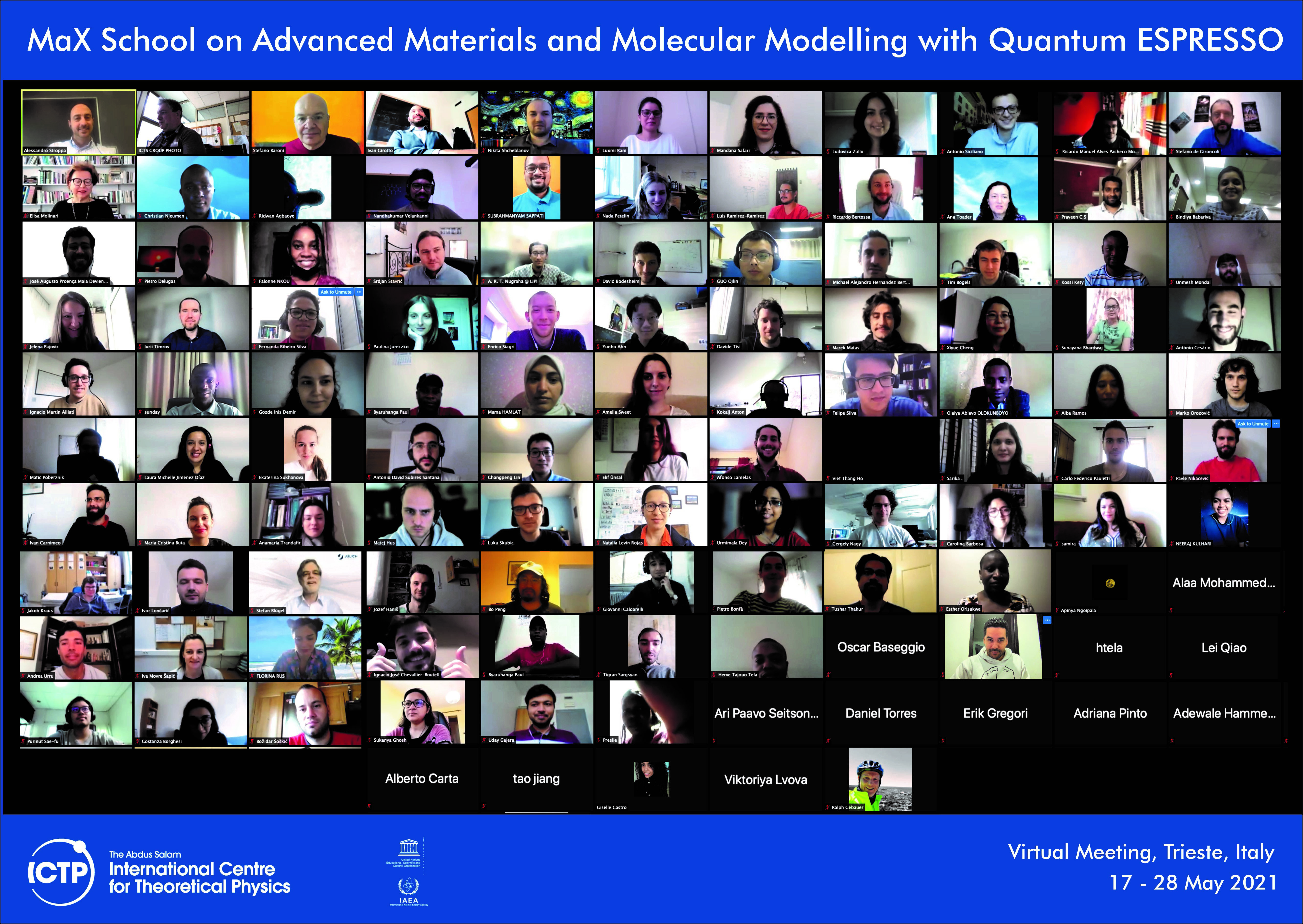
In order to optimize the interactions during the hands-on sessions, tutors were recruited by ICTP and the sessions were conducted using a combination of ZOOM breakout rooms and Slack (interactive chat) dedicated channels. In this way, tutors were able to supervise about 120 young researchers by remote.
The communication traffic analyzed by Slack Analytics can be summarized as follows: 175 people used the channels, cumulating 8327 messages since the creation of the workspace, with a peak of more than 120 active people on Slack, on the first day. In figure channels, the six most active channels of the workspace are shown.

The top three are: I) Day 3, 400 messages (forces, stress, optimizations, NEB); II) Day 4, 386 messages (functionals, hybrids, vdw); III) Day 9, 352 messages (HPC and GPU).

In figure traffic the number of active people communicating on slack is plotted day by day. In figure messages, the fraction of messages sent day by day on public or private conversations is reported.

The most innovative feature of the school was the Virtual Machine (VM), i.e. an uniform environment based on Ubuntu Linux that comes with a collection of quantum simulation codes (Quantum ESPRESSO, Xcrysden package, and others). Every participants could install the VM on his own laptop for the hands-on sessions. Furthermore, advanced excercises were run on five different HPC clusters, i.e. Ulysses (SISSA), Argo (ICTP), Arnes (ARNES), Marconi-100 (CINECA) e HZW tech Cloud computing.
Invited keynote speakers included S. BLÜGEL, Peter Grünberg Institut and Institute for Advanced Simulation, Germany, R. CAR, Princeton University, USA, F.MAURI, Sapienza University of Rome, Italy, N. SPALDIN, ETH Zurich, Switzerland, X. GONG, Fudan University, China. The closing ceremony was given by the MaX Director, Prof. Elisa Molinari (CNR-Unimore-Italy).
All participants expressed their enthusiam and gratitude for the organization of the on-line school: “Thank you so much ICTP, all organizers, subject experts and tutors for permitting us to attend the workshop in virtual mode and allowing us to attend the same using youtube live” @youtube chat, streaming session at closing cerimony. Details can be found here.
Here we show some statistics about the school participants:
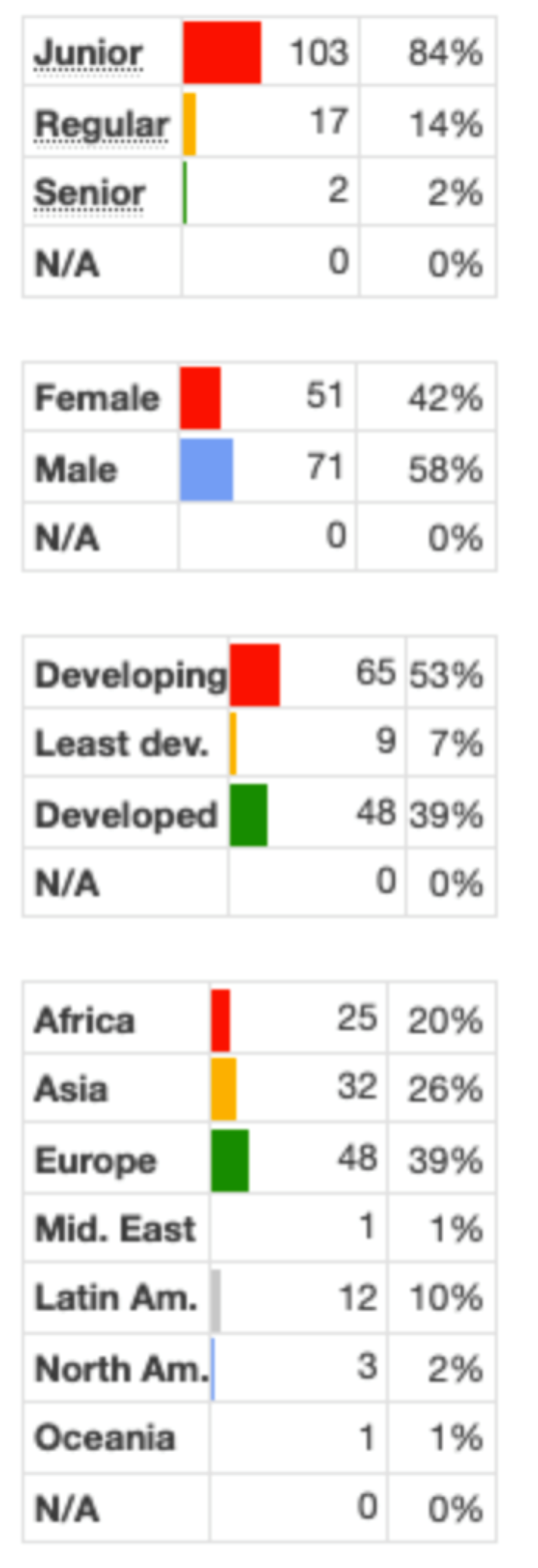
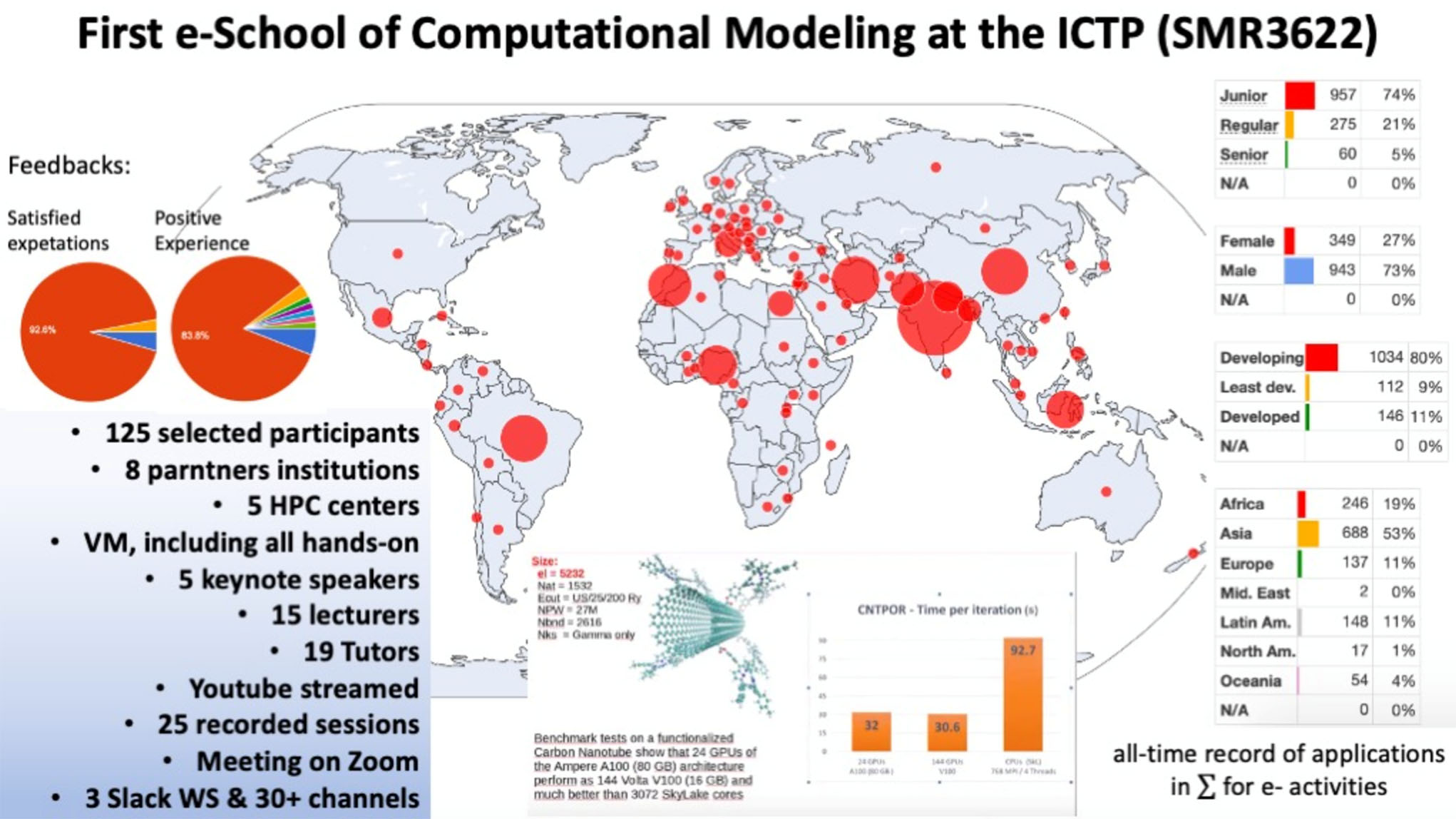
Motivated by the success of this first-edition, the organizers are already thinking about a fall-edition of the on-line school!

